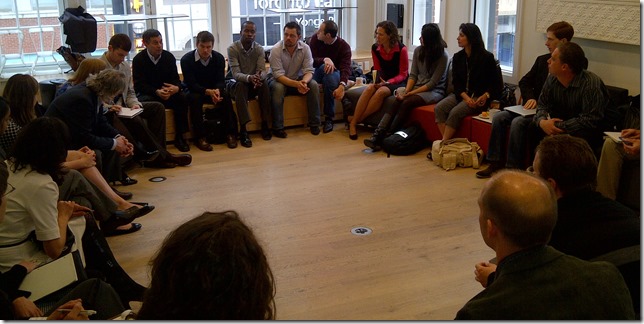Innovation Is Event Sustainability’s Call-to-Action and a Good Reason for Optimism
James Watson | Posted on |

I’m halfway through a really great book, The Ecology of Commerce: A Declaration of Sustainability, by Paul Hawken. Originally published in 1993, with a revised edition published in 2010, the book presents the harsh reality of a modern economy addicted to unchecked industrial pollution and blind mass consumerism.
Now, I do not wish to be a pessimist (the facts in the book do a fine job of that). Rather, the point I’d like to make in relation to event sustainability is an optimistic one. I’ll let a quote by Hawken set the tone:
We have the capacity and the ability to create a remarkably different economy, one that can restore ecosystems and protect the environment while bringing forth innovation, prosperity, meaningful work, and true security.” (pp.2)
Take a careful look at the event sustainability industry and you will see the very capacity and ability that Hawken describes. Truth be told, I believe that we’re on the cusp of a major period of innovation and growth in terms of event sustainability. Allow me to explain:
An Industry Capacity
capacity (noun): the maximum amount that something can produce
There’s a perfect storm brewing thanks to the collision of two independently massive industries: the events industry and the sustainability industry. Event sustainability.
The events industry is experiencing growth on a major scale. In a post we published back in March 2013, we cited a source that projected a 44% increase in employment for “meeting, convention and event planners” in the United States between 2010 and 2020. If that’s not a convincing enough statistic, consider that the Convention Industry Council (CIC) observed in the United States, between 2009 and 2012, a 10.00% increase in meeting participants, 6.74% increase in direct spending on meetings and an 8.97% increase in meetings’ contribution to GDP.
Anyone in the sustainability industry has plenty of cause for confidence too. While the unexpected streak of popularity experienced between 2008 and 2010 has worn off, sustainability continues to march on. For one, you would be hard pressed to name a Fortune 500 company that has not made an explicit sustainability commitment. Now, while some of these commitments are superfluous – i.e. they have only only gotten around to changing their light bulbs – others are much more honest and are changing the way people think about doing business (e.g. Interface, Marks & Spencer, Unilever, Method).
Now consider the idea that these two spheres are colliding. The creativity and industriousness of the events industry is combining with the ingenuity and urgency of the sustainability industry. The degree of professionalism has increased in both too. As individuals (and subsequently organizations) in either one begin to recognize the opportunity in the other, the outcome will be more innovation.
The Professional Ability
ability (noun): possession of the means or skill to do something
Innovation is driven by the ability to execute, and you need look no further than to industry standards and certifications like ISO 20121 (published in 2012), APEX/ASTM (fully released in 2013) and the Green Key Meetings Program (expected to receive an update in 2014). These standards represent the very knowledge and experience of the professionals that have pioneered this industry’s best practice. They also provide aspiring professionals an accessible means to develop their expertise and to enter the marketplace informed.
There are countless other examples that demonstrate the industry’s ability to plan sustainable events. Associations like the Green Meeting Industry Council (GMIC) come to mind. Thought leaders like Shawna McKinley and Adrian Segar. Institutions like Ryerson University. Even start-ups like yours truly: Green Event Ninjas. All proactive agents of change.
Event Sustainability’s Call-to-Action
As in Hawken’s book, the reality we’re facing in event sustainability is not very nice. Events directly and indirectly create a lot of pollution and waste. Rather than focusing on the negative, however, we must adopt a positive outlook. We must realize that there’s the potential for something truly extraordinary. Innovation is sustainability’s call-to-action. We can choose to disrupt the status quo and find opportunity in the fray – or, what else can you tell me?
Photo credit (in order): © James Watson, Green Event Ninjas.

Leave a Reply